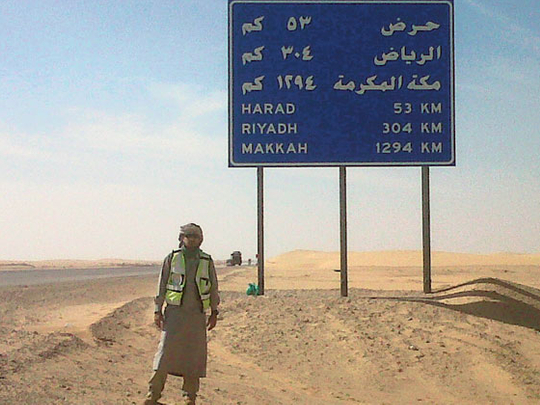
Dubai: Sometimes a strange thing happens to Jalal Bin Thaneya as he walks. Voices come floating into his head and his face breaks into a smile. One of the voices that he hears quite often goes like this: "You may walk up to Fujairah but on the way back, you will take a taxi to return." Someone said this to him way back in 2007 as he set out for his first fund-raising walk across the seven emirates.
"Here I am, still walking, and more miles than before." And there's not a taxi in sight.
Jalal is a little over 500km into his 2,000km walk to Makkah. Along the seemingly endless strip of Al Harad in Saudi Arabia ("it measures exactly 1.7 metres in width; I measured it,"), he has clocked eight days as of yesterday and is in fine form.
Of course the sun shows no mercy and there is not a leaf in sight for cover, but his survival tactic turns into a mental awning at such times. "Become one with nature, my mind tells me," says Jalal. "That's the only way to get on." Otherwise, the wrath of the sun is always walking one step ahead of you.
Desolate place
In the eight days of walking on shifting qualities of sand, he has met just two people. "It's that desolate, this place." But the meetings were not a reprieve. On the contrary, they seemed like an extension of the same experience. Conversations were perfunctory because the mind was preoccupied with things other than the here and now. And no, the weather was not a topic of conversation either even though the sun, by the hour, exhibited moods that went from scorching hot to teasingly pleasant and everything in between.
"At no given time is anything the same except the harshness of the desert," he says. But he is not complaining. The desolate surroundings stoke in him a need to deeply reflect on life and its purpose. Through a terrain that day after day feels maddeningly the same and yet not, the relationship between man and nature stencils itself on the sand, as starkly visible to the mind as the ribbon of Al Harad is visible to the eye.
"On my last walk through the Rubh Al Khali, I remember the beauty of star-studded skies at night. But when I returned to city life, I forgot all about hem. Now, I am rediscovering them every night."
Positive energy
Bin Thaneya has a peeve about the human condition. "Man forgets everything the minute he gets a break."
Man also has a skewed perception of the fundamentals of life, he says. Take positive energy for instance. The pursuit of it in city life, he believes, is like chasing after a mirage. "I see no positive energy in that lifestyle once I begin to see its true form here in the vast outdoors."
The play of contradictions that is life, the very desolateness that sometimes agitates his mind also leaves it suffused with conviction. In the middle of nowhere, he says, he feels closest to himself. The paradoxes don't stop here. At night, weary to the bone, as he sleeps without a care in the world, his dreams throw up alternate scenarios of his struggles. "It's about something I am doing but it's not exactly about the physical reality of this walk." Come daybreak, the memories of the dream don't alarm him. "I did not set out thinking it will be easy."
How long before he gets a road with a view?
"Three to four days to go before I reach Riyadh. That will be the big change."
It could be tomorrow or Monday before he gets there. "Even if you want to run, the sun won't let you," he says, referring to the pace that is sometimes forced on him by the elements. But as he said before, he is not fighting them. He knows that when you try to outrun the road, you are more likely to lose your way than if you just stay with it.












